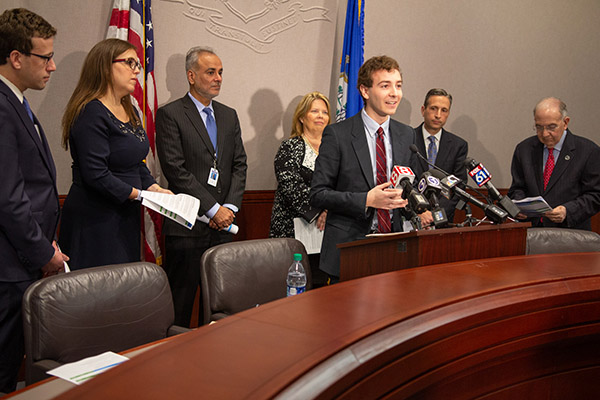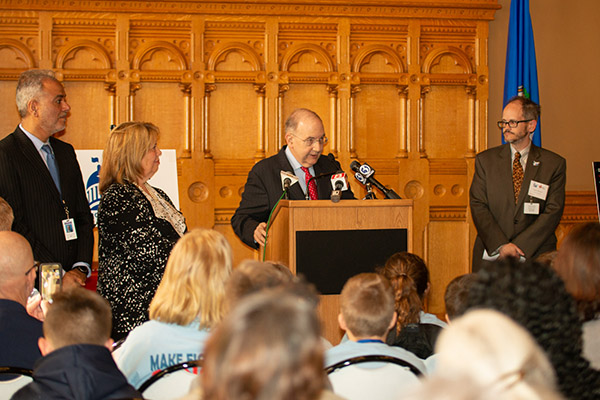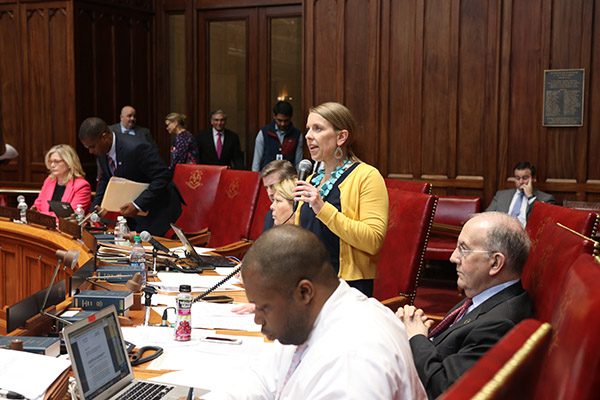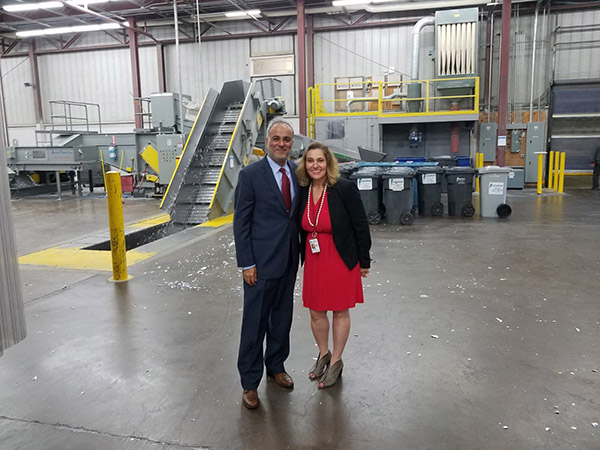Structurally Deficient Bridges in Connecticut
Connecticut’s roads and highways are dangerous and risk the safety of all our residents. There are 332 bridges in Connecticut rated as deficient or worse on the National Bridge Inventory rating scale. Deficient, as defined by Federal Highway Authority, means at least one section of a bridge is rated as poor, meaning it has advanced section loss and major deterioration. 279 of these 332 bridges–84%–have been rated in poor condition.
Search the map below to see the deficient bridges in your neighborhood.
Senator Osten: ‘The Time for Dithering is Over.’
Osten tours three bridges in Norwich to make the case for toll revenue and state investment in roads and bridges
State Senator Cathy Osten (D-Sprague) today kicked off her tour of three Norwich bridges to make the case for the creation of electronic tolling in Connecticut to help generate the revenue necessary to fix Connecticut’s massive backlog of road and bridge repairs and upgrades – including those in eastern Connecticut.
There are 332 bridges in Connecticut rated as deficient or worse on the National Bridge Inventory rating scale. Deficient, as defined by Federal Highway Authority, means at least one section of a bridge is rated as poor, meaning it has advanced section loss and major deterioration. 279 of these 332 bridges–84%–have been rated in poor condition.
Sen. Osten highlighted the numerous deficient bridges in southeastern Connecticut with a map of the various bridge locations:
“Polls show there is pubic support and business support for electronic tolling if we put that money toward improving our roads and bridges, which is exactly what we will do,” Sen. Osten said. “The time for dithering is over. Gas tax revenues are flat, our Special Transportation Fund is running out of money, the Federal Highway Administration is running on a shoestring, and Connecticut needs to join the rest of the East Coast of America in creating a fair and reliable source of revenue to keep our motorists safe and to make our businesses more productive and profitable. The alternative offered by some others – to go on a borrowing spree, and put half a century of road and bridge repairs on the state credit card – is fiscally irresponsible. The support is there for tolls. Once we have this new source of transportation revenue, that will free-up other STF monies for projects like road and bridge repairs here Norwich and eastern Connecticut.”
Sen. Osten said recent polls show public and business support for e-toll revenue to repair state roads and bridges:
- Connecticut Business and Industry Association President and CEO Joe Brennan told Fox 61 News last week that a “slight majority” of CBIA members approve of the concept of electronic tolls in Connecticut: https://fox61.com/2019/04/07/the-real-story-ct-businesses-watching-tolls-public-option-proposals/
- A Sacred Heart University poll last month (page 14) showed 35% of residents support e-tolls in Connecticut, with another 36% of residents “more likely” to support e-tolls if the funds are spent on roads, bridges, and highways. Another 15% of Connecticut residents support e-tolls regardless of whether the revenue goes into a transportation ‘lockbox’ or not: https://www.sacredheart.edu/media/sacredheart/instituteforpublicpolicy/GreatBlue-Sacred-Heart-University-Pioneer-Poll-Q1-2019.pdf
- A six-year-old Quinnipiac University poll from March, 2013 (Question 33) showed 57% public support for e-tolls in Connecticut – including 59% of women and 59% of unaffiliated voters — “if the money were used for repairs to the state’s roads and bridges.” https://poll.qu.edu/connecticut/release-detail?ReleaseID=1864
- Also, the November 2018 report by the Commission on Fiscal Stability and Economic Growth suggested (on page 24) the “imposition of congestion management tolls on certain highways” to fund improvements to Connecticut’s transportation system: https://www.cga.ct.gov/fin/tfs/20171205_Commission%20on%20Fiscal%20Stability%20and%20Economic%20Growth/20181128/Report%202.0%2011.26.18.pdf




